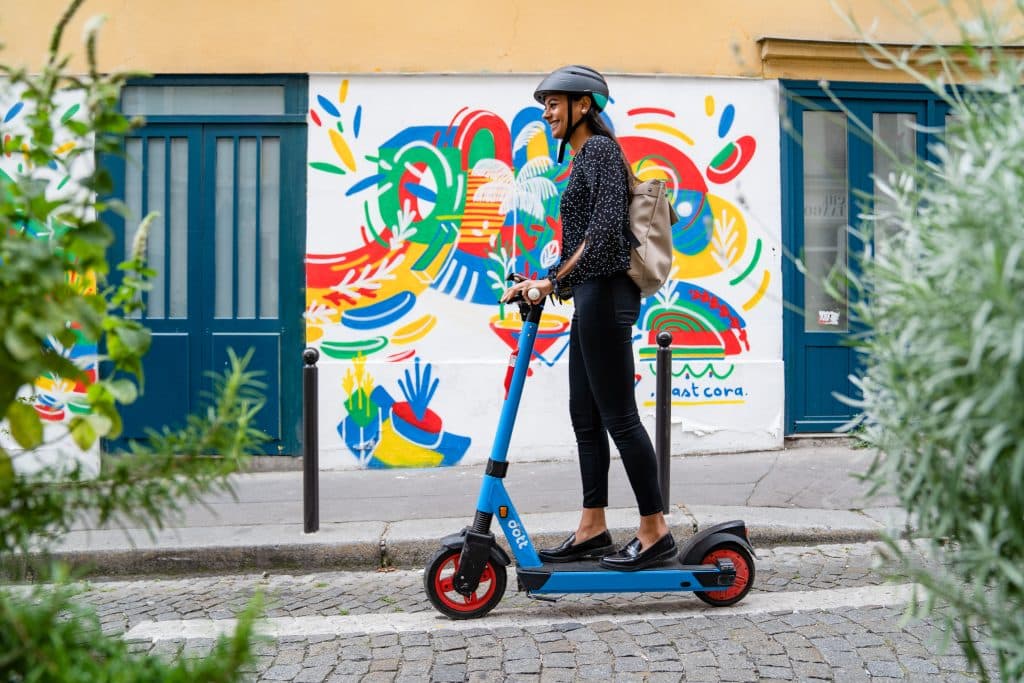E-scooter cameras reveal the real reasons behind pavement riding
Majority (71%) of incidents caused by road conditions

Image available here
Dott, the responsible European micromobility operator, today unveils new findings from research using AI-powered cameras fitted to its shared e-scooters in three major cities across Europe and Israel.
The studies measured the amount of time riders spent on pavements, as well as identifying the causes, with the aim of reducing the practice. A selection of Dott’s shared e-scooters in Brussels, Grenoble and Tel Aviv were fitted with AI cameras from Luna Systems, gathering data from over 3,000 trips and more than 6,000 km. Further studies will take place in Madrid, Lyon and London this autumn to further understand rider behaviours across Europe.
Pavement riding occurred on a very small minority of overall e-scooter use, with most of their time (93%) being ridden on roads and bike lanes. When it did happen, it was found that nearly three quarters (71%) of pavement riding occurrences were influenced by the road and infrastructure conditions.
The most frequent cause was riders mounting the sidewalk to access on-pavement scooter parking (33%), supporting on-road rather than pavement based parking spots. The second most regular cause was riders using zebra crossings which lead to a pavement (23%).
Other common causes included cycle lanes ending onto pavements (10%) as well as blocked roads or cycle lanes (7%). Only around a quarter (26%) of pavement riding occurrences were caused by irresponsible rider behaviour.
Laura Mollard-Dumont, Mobility Project Manager, City of Grenoble, said: “This new technology is beneficial to both city residents, and city authorities. It improves compliance of rules, preventing conflicts between pedestrians and riders. And it also provides us with new data, highlighting infrastructure which is not working as planned or misunderstood by users. These features demonstrate a further advantage of shared scooters over private vehicles, helping city authorities to better understand the different ways to move around the city.”
Maxim Romain, Co-Founder and COO, Dott, said: “It’s clear from these findings that the majority of e-scooter riders want to use them responsibly. If they do resort to riding on pavements, it’s often because they feel safer there. We hope to work closely with the cities we operate in to use these findings to improve road conditions and infrastructure, creating environments where people feel safer and more confident using sustainable transport in the right way.”
Dott has shared the findings with the city authorities, using mapping software which identifies hotspots for pavement riding. It is hoped that cities can use this data to prioritise which areas are most in need of infrastructure spending and street redesign.
Andrew Fleury, CEO & Co-Founder of Luna Systems:
“Computer vision provides a means to understand where and how pavement riding occurs, as well as why it happens. For every event, operators can understand the location, duration and speed as well as the number of people impacted by a rider’s behaviour. This data allows operators to communicate and engage with riders about specific occurrences. We believe that this data can also help cities better understand how to plan infrastructure to accommodate scooters in the future.”
Dott can also target specific riders who frequently ride on pavements with educational tools, such as targeted messages, invitations to safe riding courses, or if necessary, removing access to the service.
The environment and social impact are at the heart of every business decision at Dott. The micromobility company has set out its goals and progress at ridedott.com/sustainability.
-ENDS-
About Dott
Dott is a European micromobility operator founded by Henri Moissinac and Maxim Romain, with the mission to free our cities with clean rides for everyone. Dott currently operates over 40,000 e-scooters and 10,000 e-bikes in top cities in Belgium, France, Israel, Italy, Poland, Spain and the UK. Dott has a staff of over 600, with its main teams located in Amsterdam, London and Paris.
About Luna
Luna Systems is the leader in AI (Computer Vision) camera systems and ARAS for the next generation of B2B & B2C electric mobility. Its high-accuracy algorithmic solutions safety compliance solutions for the shared micromobility market, reducing the core problems of sidewalk riding, collisions and disorderly parking, as well as B2C safety features for the consumer e-scooter and e-bike market. In the electric two-wheeler market, Luna supports next-gen ARAS capabilities to reduce collisions in real-time, whilst also supporting positive change in rider behaviour through AI-coaching as well as the provision of privacy-sensitive data to support broader stakeholder engagement on electric two-wheeler fatalities.